It is awards seasons, with finalists for the Whitney Awards out and the AML Awards coming out. Julie Berry and Jeff Zentner were given some of the highest YA honors from the American Library Association, as well as being finalists for both Whitney and AML awards. Tim Slover’s play Virtue was widely praised and quickly sold out. The LDS Film Festival is happening this week. New books and reviews will be discussed in part 2, coming soon. Please send announcements and corrections to: mormonlit AT gmail DOT com.
Awards and honors
 LDStorymakers, a Mormon author guid, announced The Whitney Awards finalists, awards that honor novels published by Mormon authors. The categories are: General, Historical, Mystery/Suspense, Contemporary Romance, Historical Romance, Speculative, Middle Grade, General Young Adult, Speculative Young Adult, and Best Novel by a Debut Author.
LDStorymakers, a Mormon author guid, announced The Whitney Awards finalists, awards that honor novels published by Mormon authors. The categories are: General, Historical, Mystery/Suspense, Contemporary Romance, Historical Romance, Speculative, Middle Grade, General Young Adult, Speculative Young Adult, and Best Novel by a Debut Author.
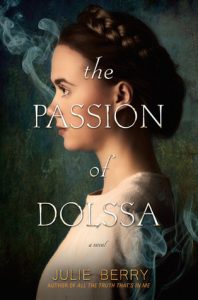 Julie Berry’s The Passion of Dolssa was awarded a Pritnz Honor Prize by the American Library Association. The Michael L. Printz Award annually honors the best book written for teens, based entirely on its literary merit, each year, it is the Oscar of YA literature. Congressman John Lewis and his collaborators won the main award for their book March: Book Three, a graphic novel about the civil rights movement. The Passion Dolssa was one of four books given an “Honor Prize”, for excellence in YA literature.
Julie Berry’s The Passion of Dolssa was awarded a Pritnz Honor Prize by the American Library Association. The Michael L. Printz Award annually honors the best book written for teens, based entirely on its literary merit, each year, it is the Oscar of YA literature. Congressman John Lewis and his collaborators won the main award for their book March: Book Three, a graphic novel about the civil rights movement. The Passion Dolssa was one of four books given an “Honor Prize”, for excellence in YA literature.
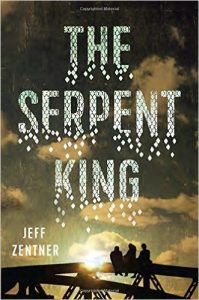 Jeff Zentner was awarded the William C. Morris YA Debut Award for The Serpent King. The Morris Award is given annually to a work of young adult literature by a “first-time author writing for teens”. It is administered by the Young Adult Library Services Association (YALSA), a division of the American Library Association (ALA).
Jeff Zentner was awarded the William C. Morris YA Debut Award for The Serpent King. The Morris Award is given annually to a work of young adult literature by a “first-time author writing for teens”. It is administered by the Young Adult Library Services Association (YALSA), a division of the American Library Association (ALA).
Summerlost, by Ally Condie, was nominated by the Mystery Writers of America for the 2017 Edgar Award, in the Best Juvenile (which means Middle Grade) category. The award winner will be announced at the Edgars Banquet on April 27.
Michael Collings’ sonnet cycle, Corona Obscura, is a finalist for the Horror Writers Association’s 2016 Bram Stoker Award for poetry. This is Collings’ second appearance as a finalist in poetry and third for a Bram Stoker overall.
Finalists for the 2017 Audie Awards include Brandon Sanderson’s novel The Bands of Mourning in the Fantasy category, and Brodi Ashton et al’s My Lady Jane in the Young Adult category.
Dialogue Fiction Award Winners, 2016. Honoring the best stories printed in Dialogue: A Journal of Mormon Thought in 2016. 1. Wm Morris. “The Darkest Abyss in America.” 2. Eric W. Jepson. “The Laurel’s First-Night Fantasies.” 3. Steven Peck. “Bishop Johnson Rescues a Lost Soul: A Tale of Pleasant Grove.”
Eugene England Memorial Essay Award, 2016 winners. 1. Lon Young. “That’s Where the Light Enters” 2. Stephen Carter, “Three Sealings”.
This award is given by Dialogue, and is easily confused with the Sunstone-run Eugene England Memorial Personal Essay contest. Speaking of which,
Today is the deadline for the 2017 Eugene England Memorial Personal Essay Contest. A total of $450 will be shared among the winning entries.
Blog posts
Doug Gibson has created a blog, Culture of Mormonism, where he has been reprinting his columns from then he wrote for the Ogden Standard-Examiner, along with the Grondhal cartoons that went with many of them, about Mormon culture, history, and literature. Topics so far include C.S. Lewis’ The Great Divorce and the LDS Spirit World and The 1917 anti-Mormon penny dreadful film that was a hit.
Patrick Madden is interviewed by Sweet magazine about his AML-award finalist non-fiction essay collection Sublime Physick, and the humorous side of the band Rush.
Theric Jepson. Mormons as Normal People: a brief look at the Mormon elements in Anthony Holden’s Precious Rascals. A Motley Vision. Theric’s short take on the AML Comics Award-finalist comic strip. “I wasn’t aware of Holden until a couple months ago, but now I am exceedingly aware of him. This book collects strips he’s made over the years FOR his family, along with some commentary, turning it into an interesting hybrid of memoir and collection. The strips are genuinely funny and the look at his (very Mormon) family life is sharp and nuanced and layered and personal and, worth repeating, funny. Highly recommended!”
Jared Cook compares Enoch to Nienna, the weeping goddess of Tolkien’s the Silmarillion, at By Common Consent.
Recent Mormon Literature Academic Theses
Lauren Fields. Out of the Best Books: Mormon Assimilation and Exceptionalism Through Secular Reading. BYU Department of English, MA, June 2016. “This thesis seeks to explore the relationship between Mormon assimilation, exceptionalism, and their endeavors in secular reading by analyzing Out of the Best Books (OOBB), a 1964–71 five-volume reading guide and reading program on secular reading established by the Mormon Church for its women’s organization, the Relief Society. Examining the approaches to secular literature in the OOBB program suggests that Mormons can respond to their competing desires to separate and assimilate by making efforts that fulfill both aspirations simultaneously rather than moving exclusively in one direction. Yet OOBB’s efforts to achieve both objectives did not amount to an entirely seamless navigation of this paradox. The program’s attempts to incorporate texts that might challenge Mormon notions of morality as well as their efforts to introduce world literature and fully address their female audience raised additional tensions particularly relevant to contemporary Mormonism, suggesting the complexity of Mormons navigating this identity paradox both within the context of the OOBB program and today. Furthermore, this examination of OOBB offers a venture at fleshing out the history of Mormon reading, confirming Mormons’ relationship to literature as central to their conception and expression of identity and situating Mormon reading endeavors in the broader context of American reading practices.”
Isabelle Wagner. Brian Evenson: A movement from a position of faith to a position of unbelief. MA. University of Leiden. July 2016. Wanger quotes Mormon literary theorists, including Schott Hales and Eugene England.
Magazines and short works
 The Winter 2016 issue of Dialogue: a journal of Mormon thought is now available. Literary content includes: Steven Peck’s short story “Bishop Johansen Rescues a Lost Soul: A Tale of Pleasant Grove”, poetry by Conner Bassett and Tyler Clark, and personal essays by Craig Mangum and Brooke Larson. Book reviews include Stephen Carter and Jett Atwood, Mormonism for Beginners, reviewed by Cristina Rosetti. Eric Freeze, Invisible Men: Stories, reviewed by Lisa Ramsey Harris. Ashley Mae Hoiland, One Hundred Birds Taught Me to Fly: The Art of Seeking God, reviewed by Glen Nelson. Patrick Madden, Sublime Physick: Essays, reviewed by Joe Plicka. A review essay by Jenny Webb of three recent republications: John Russell, The Mormoness; Or, The Trials of Mary Maverick, and Boadicea; The Mormon Wife: Life-Scenes in Utah, both edited and annotated by Michael Austin and Ardis E. Parshall, and Nephi Anderson, Dorian: A Peculiar Edition with Annotated Text & Scholarship, edited by Eric W. Jepson.
The Winter 2016 issue of Dialogue: a journal of Mormon thought is now available. Literary content includes: Steven Peck’s short story “Bishop Johansen Rescues a Lost Soul: A Tale of Pleasant Grove”, poetry by Conner Bassett and Tyler Clark, and personal essays by Craig Mangum and Brooke Larson. Book reviews include Stephen Carter and Jett Atwood, Mormonism for Beginners, reviewed by Cristina Rosetti. Eric Freeze, Invisible Men: Stories, reviewed by Lisa Ramsey Harris. Ashley Mae Hoiland, One Hundred Birds Taught Me to Fly: The Art of Seeking God, reviewed by Glen Nelson. Patrick Madden, Sublime Physick: Essays, reviewed by Joe Plicka. A review essay by Jenny Webb of three recent republications: John Russell, The Mormoness; Or, The Trials of Mary Maverick, and Boadicea; The Mormon Wife: Life-Scenes in Utah, both edited and annotated by Michael Austin and Ardis E. Parshall, and Nephi Anderson, Dorian: A Peculiar Edition with Annotated Text & Scholarship, edited by Eric W. Jepson.
Mormon Studies Review. Volum3:4, 2017. Includes these book reviews: Nathan Thatcher, Paco, by Michael Hicks. Ignacio M. García, Chicano While Mormon: Activism, War, and Keeping the Faith, by Rudy V. Busto.
Spencer Hyde. “THE TEACHERS GUIDE TO FAMOUS POETRY PLAGIARIZED BY UNDERGRADS USING WORD’S RIGHT-CLICK SYNONYM FINDER.” McSweeny’s. Feb. 20.
Eric James Stone. “P.R. Problems”. Reprinted in the anthology Funny Horror. A collection of humorous horror stories.
Theater
 Tim Slover. Virtue. Plan-B Theatre Company, Cathedral Church of St. Mark, Salt Lake City. Feb. 16-26. Slover explores the conflict between religious traditions and personal revelation through the story of 12th-century German abbess Hildegard of Bingen. The entire run sold out. This is the play’s first fully staged production. In 2014, it was performed as a staged reading (with scripts in hand) at the Fulton Theatre in Lancaster, Pennsylvania. It also has been performed similarly in various venues around the country, including The Julliard School and at the University of Utah. Salt Lake Tribune feature story. The Utah Review feature story. Radio West interview with Tim Slover.
Tim Slover. Virtue. Plan-B Theatre Company, Cathedral Church of St. Mark, Salt Lake City. Feb. 16-26. Slover explores the conflict between religious traditions and personal revelation through the story of 12th-century German abbess Hildegard of Bingen. The entire run sold out. This is the play’s first fully staged production. In 2014, it was performed as a staged reading (with scripts in hand) at the Fulton Theatre in Lancaster, Pennsylvania. It also has been performed similarly in various venues around the country, including The Julliard School and at the University of Utah. Salt Lake Tribune feature story. The Utah Review feature story. Radio West interview with Tim Slover.
Barbara M. Bannon, Salt Lake Tribune review: “Utah playwright Tim Slover is an alchemist with words, eloquently breathing life into pasteboard historical characters such as Queen Elizabeth I, composer George Frideric Handel and statesman Alexander Hamilton. Under the transforming power of his pen, these characters jump off the page and become completely human . . . These characters connect and collide in touchingly human ways, and the actors expertly capture their complexity and struggle to reconcile their faith with individual desires and needs. Each actor fully explores the nuances and contradictions of the bottomless characters Slover has created . . . “Virtue” is a stunning portrait of an extraordinary woman and the love, both human and divine, that shaped her life. Through this three-dimensional production, the power of that love transcends time and becomes a gift to us. May we use it faithfully in these fragmented and fractured times.”
Scott Renshaw, City Weekly. “Slover’s text sets up Cuno as a fairly obvious villain of the piece, his ambition and worldliness agitating against Hildegard’s insistence on the purity of her visions. Perry does fine work with a character who’s mostly a walking manifestation of hypocrisy, but Rogers’ Volmar provides a more complex antagonist in his jealousy and inability to process his feelings for Hildegard. It’s the central relationship between Hildegard and Richardis that provides the richest emotional content, as the two women wrestle with the collision between their own feelings and the teachings of the Church regarding same-sex attraction. Summerhays is typically superb in a role that combines an unapologetic earthiness with profound conviction, while Starr nails the tortured soul who is convinced that she’s damned for the only kind of love that makes sense to her. Slover might make his antagonist too easily dismissed, but Virtue still delivers a powerful testament to feeling what is right, rather than accepting the version of the right that someone else is trying to sell you.”
Ann Poore 15 Bytes. “Thank you, Plan-B, for a truly wonderful evening of theater. Really, Virtue couldn’t have been more enjoyable – practically perfect in every way: Playwright Tim Slover’s excellent script; Jerry Rapier’s direction of a superb cast; Thomas George’s striking set; the excellent sound design by Cheryl Cluff.”
 Chandra Lloyd. Happysadness. BYU Nelke Theatre, Feb. 23-25. Written by recent BYU alumna Chandra Lloyd, happysadness went through a writer/dramaturg/actor workshop at BYU before being selected as the “Microburst” performance of 2017. The semi-autobiographical play tackles the difficult topic of mental illness with humor, creativity and empathy. Lloyd has dealt with, and continues to deal with, anxiety and depression in her life and her goal was to create a character (Val) and story that people would care about and connect with in order to discuss mental health. It includes the use of puppets to personify the different parts of mental illness.
Chandra Lloyd. Happysadness. BYU Nelke Theatre, Feb. 23-25. Written by recent BYU alumna Chandra Lloyd, happysadness went through a writer/dramaturg/actor workshop at BYU before being selected as the “Microburst” performance of 2017. The semi-autobiographical play tackles the difficult topic of mental illness with humor, creativity and empathy. Lloyd has dealt with, and continues to deal with, anxiety and depression in her life and her goal was to create a character (Val) and story that people would care about and connect with in order to discuss mental health. It includes the use of puppets to personify the different parts of mental illness.
Russell Warne, UTBA. “Happysadness is a play about depression that could have been relevant to many people. Unfortunately, this production did not live up to its potential. Happysadness tells the story of Val, a young woman suffering from depression and an anxiety disorder. Most of the play revolves around Val’s symptoms and how she struggles to deal with them. Val’s experiences are punctuated regularly by therapy sessions—most of which blend together before the play reaches its halfway point. One inherent problem with the script is that Val—the central character—is not a fully developed human being. Instead, she is a collection of symptoms. In fact, I have the sneaking suspicion that Lloyd looked up the diagnosis criteria for major depressive disorder in the Diagnostic and Statistical Manual of Mental Disorders and tried to fit every symptom into the script. Beyond her symptoms Val’s only characteristic is her love for rock music, a trait so emphasized that hearing about it grows tiresome as the play continues. I have never spent so much time with a character without learning anything meaningful about them . . . In addition to the shallow character development, Lloyd’s script has inherent structural problems. The first 80 minutes of the play mostly switches between Val’s symptoms and the therapy sessions. This format grows dull, and the play would have been greatly strengthened with a secondary plot and more interpersonal conflict.”
Morag Place Shepherd. Not One Drop. Plan-B, March 23-April 2. One of two winners of the David Ross Fetzer Foundation for Emerging Artists grant at Plan-B Theatre. Intimacy, identity, power, life, death. A fall, a push, a murder. A sideways glance at the roles we play to convince ourselves we are(n’t) who we think we are. Or If Caryl Churchill and Sarah Kane were to have a literary baby, this play would be that baby. A weird, wacky baby.
Film
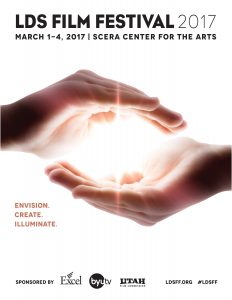 The 16th LDS Film Festival will be held March 1-4, at the SCERA Center for the Arts, Orem, UT. Among the major films that will be screened are: Wednesday: Love Everlasting (Drama, Rob Diamond). Thursday: Hello I Love You (Romantic comedy, Spanky Ward), Peace Officer (Documentary, 2016 AML Film Award winner, Scott Christopherson and Brad Barber), and CTU: Provo (2007 comedy/action, Alan Seawright). Friday: Recommended Daily Amount (Documentary, Alan Seawright), I Want Abs (Documentary, Sergei Boutenko), The Uncomfortable Truth (Documentary, Loki Mulholland), Magellan (SF, Rob York), Mythica 5: The Godslayer (Fantasy, John Lyde), Sacred Vow (Family drama, Rob Diamond). Saturday: The Mormon Connection (Documentary, Brandon C.W. Johnson, Cody Myers, Wendall Strong), Story Tellers (Frontier-era drama, John Lyde), Modifying Reality (Animation documentary, Jared Jakins), The Last Descent (Drama, Isaac Halasima), 626 Evolution (Speculative drama, John Lyde), Moose the Movie (Comedy, G. Logan Dellinger), The Next Door (Missionary noir, Barrett Burgin).
The 16th LDS Film Festival will be held March 1-4, at the SCERA Center for the Arts, Orem, UT. Among the major films that will be screened are: Wednesday: Love Everlasting (Drama, Rob Diamond). Thursday: Hello I Love You (Romantic comedy, Spanky Ward), Peace Officer (Documentary, 2016 AML Film Award winner, Scott Christopherson and Brad Barber), and CTU: Provo (2007 comedy/action, Alan Seawright). Friday: Recommended Daily Amount (Documentary, Alan Seawright), I Want Abs (Documentary, Sergei Boutenko), The Uncomfortable Truth (Documentary, Loki Mulholland), Magellan (SF, Rob York), Mythica 5: The Godslayer (Fantasy, John Lyde), Sacred Vow (Family drama, Rob Diamond). Saturday: The Mormon Connection (Documentary, Brandon C.W. Johnson, Cody Myers, Wendall Strong), Story Tellers (Frontier-era drama, John Lyde), Modifying Reality (Animation documentary, Jared Jakins), The Last Descent (Drama, Isaac Halasima), 626 Evolution (Speculative drama, John Lyde), Moose the Movie (Comedy, G. Logan Dellinger), The Next Door (Missionary noir, Barrett Burgin).
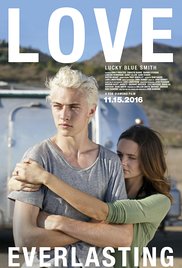 Love Everlasting. Rob Diamond, director, producer, and writer. February 9 Utah theatrical release. It had already been released on iTunes and other platforms in 2016. “Bridger Jenkins, a senior in high school, is an outsider with hidden scars and a lifelong dream to see the ocean. Living in poverty, his mother has done everything in her power to give her son a good life, but their world is once again turned upside down when Bridger’s abusive stepfather threatens their lives. On the road with only 197 dollars to their name, Bridger and his mother embark on the journey of a lifetime. But a series of obstacles foil their plan and they end up stuck in the middle of nowhere – a small town that will prove to change their destiny. When Bridger has a chance encounter with a brown-eyed beauty shrouded in insecurity, sparks fly and an everlasting bond is ignited between two misfits longing for acceptance and true love.”
Love Everlasting. Rob Diamond, director, producer, and writer. February 9 Utah theatrical release. It had already been released on iTunes and other platforms in 2016. “Bridger Jenkins, a senior in high school, is an outsider with hidden scars and a lifelong dream to see the ocean. Living in poverty, his mother has done everything in her power to give her son a good life, but their world is once again turned upside down when Bridger’s abusive stepfather threatens their lives. On the road with only 197 dollars to their name, Bridger and his mother embark on the journey of a lifetime. But a series of obstacles foil their plan and they end up stuck in the middle of nowhere – a small town that will prove to change their destiny. When Bridger has a chance encounter with a brown-eyed beauty shrouded in insecurity, sparks fly and an everlasting bond is ignited between two misfits longing for acceptance and true love.”
Sean Means, SL Tribune. 2.5 stars. “Two scarred teens find each other in a small Utah town in “Love Everlasting,” a nicely acted but predictably tragic young-adult romance . . . Writer-director Rob Diamond (who made the 2014 biblical allegory “Wayward: The Prodigal Son”) doesn’t reinvent the wheel here, and his melodramatic beats fall pretty much where you’d expect. He gets good mileage out of the beautiful Utah landscapes. The saving grace of “Love Everlasting” is the cast, a mix of Hollywood pros (like Procter and Stevens) and local talent (such as Landon Henneman, who’s charming as a sympathetic teacher). And while fangirls will swoon over Smith’s Adonis looks, Burke’s tender portrayal of the battered but resilient Clover is the performance that stands out most.”
Scott Renshaw, Salt Lake Weekly. 2.5 stars. “Local writer/director Rob Diamond applies his earnest “Utah values” style to a genre where it actually seems to be a perfect fit: teen romantic drama . . . There’s nothing groundbreaking in the way Diamond dives into the union of wounded souls Bridger and Clover, but the performances are generally strong, particularly Burke and Austin R. Grant as the kind of vacant-eyed bully most high-school survivors recognize. It’s a solid enough slice of melodrama that unfortunately peaks too soon, leaving a final 20 minutes that feels more like an extended coda, and suggests that Diamond might have had a much stronger script if he’d made it clear early on that this is really Clover’s story, much more than Bridger’s.”
Josh Terry, Deseret News. 1.5 stars. “Unfortunately, there’s not much more to recommend director Rob Diamond’s star-crossed romance to audiences, local or no . . . There are some good ideas floating around this film, and cinematographer Lars Lindstrom has shot many scenes in gorgeous lighting. The film’s theme of outcasts finding love has some potential, but there just isn’t enough conflict to keep things interesting, and too often Diamond’s film trips up on the fundamentals. Awkward dialogue and stiff delivery make many scenes drag and too many elements of the story feel contrived, which results in a small town where everyone over 18 is quick to give you shelter and employment at the drop of a hat, but everyone under 18 is happy to laugh at you mercilessly when the bully pushes you over at school . . . Sadly, “Love Everlasting” just can’t justify the full ticket price.”
Sacred Vow. Rob Diamond, director, producer, and writer. It had a limited release in the Christian market in Oct. 2016. DVD release in Feb. 2017. “Doug and Amber were madly in love and married during their college years. Driven by the “dream” of a prosperous life together, Amber worked two jobs to put Doug through school. Soon afterward, they shared in his business success and celebrated the birth of their precious, beautiful daughter. Fast forward 15 years, Amber has continued to be committed to her husband and their marriage, but Doug has fallen into the traps of an unfaithful spouse, convincing himself that he wants more out of life. In the midst of this turmoil, tragedy strikes, but the series of events that follow just might give this couple a chance to survive and regain the love for one another that they pledged in their sacred vows 15 years earlier.”
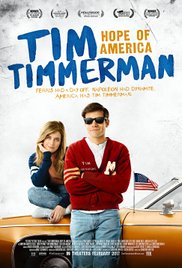 Tim Timmerman, Hope of America. Cameron Sawyer, Director, producer, and co-writer. Justin Copier, co-writer. High School comedy, set in 1994 Utah. March 3 theatrical release in Utah. Distributed by Purdie Distribution. Sawyer and Copier were interviewed on The Cultural Hall podcast.
Tim Timmerman, Hope of America. Cameron Sawyer, Director, producer, and co-writer. Justin Copier, co-writer. High School comedy, set in 1994 Utah. March 3 theatrical release in Utah. Distributed by Purdie Distribution. Sawyer and Copier were interviewed on The Cultural Hall podcast.
LDS Media Talk: “This movie is the first theatrical release by VidAngel Studios, the movie platform that lets you filter language, nudity, violence, and other objectionable content from movies and TV shows. VidAngel is currently in a high profile legal battle with Hollywood studios to continue offering family-friendly filtering of their movies. In response to the court injunction that has forced VidAngel from offering its core service, the company has fast-tracked original, family-friendly movies.”
The Reel Deal. 2 stars. “The overall story of the movie is cute and, as a whole, entertaining enough. The main character, Tim Timmerman, is a good character who has a pretty clear character arc that he stays true to . . . There are also some well written jokes in this movie, but one I particularly enjoyed was the recurring “assassins” gag. Tim and some of his friends are involved in a schoolwide game of assassins . . . Each time, this results in both characters dropping whatever they are doing and starting a ridiculous, over-the-top chase scene. This happens three or four times in the movie and each time made me chuckle about how silly and random these scenes are. Now onto the issues with the movie, primarily the writing. This was the first movie made by this production team. They didn’t have to tell me; I just knew. Aside from a few good characters, the writing in this movie is all over the place. The plot is made up primarily of cliché after cliché, loosely tied together by inconsequential plot points that are inserted solely as a method of filling time before the next cliché. There is the guy who starts off using the girl but slowly realizes that he actually has feelings for her. There is the reveal to the girl that he had been using her all along . . . All of these overdone situations and characters made me feel like I had already seen this movie; I could have told you the exact ending ten minutes in. Not only is the plot recycled from countless rom-coms and coming of age stories; parts of the plot just don’t make sense . . . While the amateur team of Tim Timmerman, Hope of America does a lot of things right, the issues in this movie are too big to ignore and distract from the story they are trying to tell. Many of these issues can be attributed to lack of experience and, hopefully, they can improve in these areas going forward. For now, all they have to show is a mildly funny and very cheesy teen movie.”

.
It is hard to keep up this month….